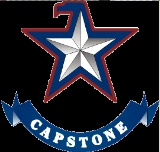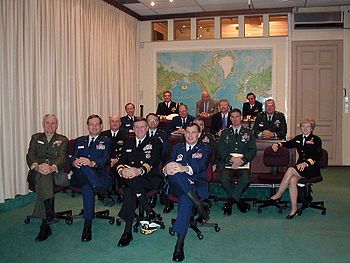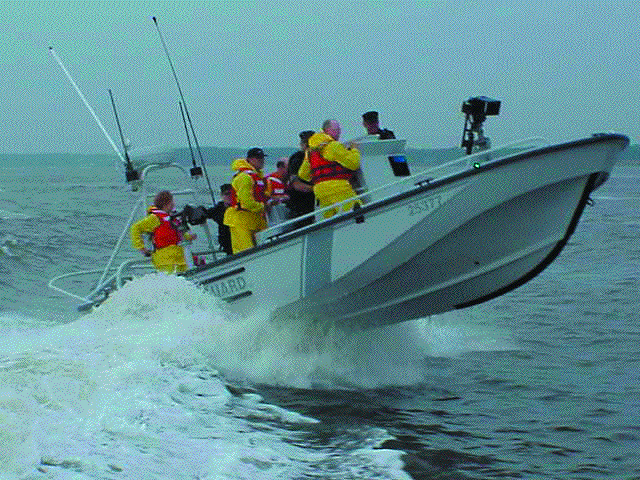
CAPSTONE Military Leadership Program
Encyclopedia
CAPSTONE is a joint service professional military education courses for newly promoted brigadier generals and rear admiral
s serving in the United States military. The National Defense University
conducts the CAPSTONE course at Fort Lesley J. McNair
in Washington, DC. The course objective is to ensure senior military leaders understand how military forces and other elements of national power are integrated and used to support national military strategies, and how joint, interagency, and multinational operations support strategic national objectives.
(JCS) directed the National Defense University to establish a professional military education program for brigadier generals and rear admiral selectees. Two eleven-week pilot programs were offered in 1983. In February 1984, the JCS approved a permanent course to be offered once a year. This new course was eight weeks in duration. In July 1986, the JCS reduced the course length to six weeks and increased the frequency to two courses per year.
The Goldwater-Nichols Defense Reorganization Act
of 1986 made CAPSTONE mandatory for all newly selected generals and admirals. Subsection 663(a) of the Act titled “Capstone Course for New Generals and Flag Officers,” specifically required that “Each officer selected for promotion to the grade of brigadier general or, in the case of Navy, rear admiral (lower half) shall be required, after such selection, to attend a military education course designed specifically to prepare new generals and flag officers to work with the other armed forces.” In 1987, the number of CAPSTONE courses was increased to four per year to satisfy the statutory requirement.
 CAPSTONE participants are referred to as "Fellow
CAPSTONE participants are referred to as "Fellow
s" because of the unique nature of the course and the special expertise and qualifications of those officers attending. The course differs from senior service schools in four ways. First, the rank of its participants; second, the class size and course duration; third, the course focuses on the employment of military forces in support of United States national policy objectives; and finally, the course provides personal interaction with United States military’s most senior commanders. Guest speakers include the Chairman of the Joint Chiefs, all of the Service Chiefs, the commanders of all the unified commands as well as senior officials from the Department of Defense
, Department of State, National Security Council
, and members of Congress
.
The course requires intensive personal involvement on the part of each CAPSTONE Fellow through participation in seminars, field trips, discussions, and the current issues exercise. There are many opportunities for each Fellow to share expertise and experiences with other participants. The CAPSTONE course does not include formal writing or research assignments. The amount of required readings is modest and is used to highlight key issues and prepare participants for indepth discussions. After their overseas field study, Fellows do prepare a trip report that captures their findings.
Several “Senior Fellows” are assigned to each CAPSTONE class. Senior Fellows are retired four-star generals and admirals who volunteer to participate in the CAPSTONE program. They provide a unique dimension to the course. Their principal contribution lies in their day-to-day contact with CAPSTONE participants. Their breadth of experience, often gained in politically sensitive positions, qualifies them to serve as role models, to interpret international events and military issues, and to provide insights not readily available from other sources.
All presentations and discussions at CAPSTONE are covered by the National Defense University’s non-attribution policy. As a result of this policy, nothing a speaker says during a class session will be attributed to the speaker directly or indirectly in the presence of anyone who was not authorized to attend the lecture. This policy is morally binding on everyone who participates in the CAPSTONE program.
 The CAPSTONE curriculum examines major issues affecting national security decision making, military strategy
The CAPSTONE curriculum examines major issues affecting national security decision making, military strategy
, joint doctrine
, service interoperability, and familiarizes senior officers with allied nations. The course includes guest speakers, seminars, case studies, group discussions, and visits to military commands and operational units located in the continental United States. Students are divide into three groups to participate in overseas trips to Europe
, the Pacific region, and the Western Hemisphere
. The overseas field studies involve interactions with senior commanders of United States unified commands, American Ambassadors, allied military leaders, and senior political leaders of foreign governments.
During the course CAPSTONE Fellows analyze the national security policy process. They discuss joint doctrine and joint operational concepts. They study joint, interagency, and multinational capabilities, and discuss how these capabilities are best integrated to accomplish United States national security objectives. They discuss strategies for conduction joint and combined operations
within modern theater battle space. They access the impact of defense acquisition programs and their implications for enhancing joint military capabilities. The course also analyzes the relationship between the military services, Department of Defense agencies, other cabinet-level departments, the National Security Council, Congress, the media, and the American public.
Rear Admiral
Rear admiral is a naval commissioned officer rank above that of a commodore and captain, and below that of a vice admiral. It is generally regarded as the lowest of the "admiral" ranks, which are also sometimes referred to as "flag officers" or "flag ranks"...
s serving in the United States military. The National Defense University
National Defense University
The National Defense University is an institution of higher education funded by the United States Department of Defense, intended to facilitate high-level training, education, and the development of national security strategy. It is chartered by the Joint Chiefs of Staff, with Navy Vice Admiral...
conducts the CAPSTONE course at Fort Lesley J. McNair
Fort Lesley J. McNair
Fort Lesley J. McNair is a United States Army post located on the tip of a peninsula that lies at the confluence of the Potomac River and the Anacostia River in Washington, D.C. To its west is the Washington Channel, while the Anacostia River is on its south side...
in Washington, DC. The course objective is to ensure senior military leaders understand how military forces and other elements of national power are integrated and used to support national military strategies, and how joint, interagency, and multinational operations support strategic national objectives.
History
On 26 May 1982, the Joint Chiefs of StaffJoint Chiefs of Staff
The Joint Chiefs of Staff is a body of senior uniformed leaders in the United States Department of Defense who advise the Secretary of Defense, the Homeland Security Council, the National Security Council and the President on military matters...
(JCS) directed the National Defense University to establish a professional military education program for brigadier generals and rear admiral selectees. Two eleven-week pilot programs were offered in 1983. In February 1984, the JCS approved a permanent course to be offered once a year. This new course was eight weeks in duration. In July 1986, the JCS reduced the course length to six weeks and increased the frequency to two courses per year.
The Goldwater-Nichols Defense Reorganization Act
Goldwater-Nichols Act
The Goldwater-Nichols Department of Defense Reorganization Act of 1986 , , made the most sweeping changes to the United States Department of Defense since the department was established in the National Security Act of 1947 by reworking the command structure of the United States military...
of 1986 made CAPSTONE mandatory for all newly selected generals and admirals. Subsection 663(a) of the Act titled “Capstone Course for New Generals and Flag Officers,” specifically required that “Each officer selected for promotion to the grade of brigadier general or, in the case of Navy, rear admiral (lower half) shall be required, after such selection, to attend a military education course designed specifically to prepare new generals and flag officers to work with the other armed forces.” In 1987, the number of CAPSTONE courses was increased to four per year to satisfy the statutory requirement.
Participation

Fellow
A fellow in the broadest sense is someone who is an equal or a comrade. The term fellow is also used to describe a person, particularly by those in the upper social classes. It is most often used in an academic context: a fellow is often part of an elite group of learned people who are awarded...
s" because of the unique nature of the course and the special expertise and qualifications of those officers attending. The course differs from senior service schools in four ways. First, the rank of its participants; second, the class size and course duration; third, the course focuses on the employment of military forces in support of United States national policy objectives; and finally, the course provides personal interaction with United States military’s most senior commanders. Guest speakers include the Chairman of the Joint Chiefs, all of the Service Chiefs, the commanders of all the unified commands as well as senior officials from the Department of Defense
United States Department of Defense
The United States Department of Defense is the U.S...
, Department of State, National Security Council
United States National Security Council
The White House National Security Council in the United States is the principal forum used by the President of the United States for considering national security and foreign policy matters with his senior national security advisors and Cabinet officials and is part of the Executive Office of the...
, and members of Congress
United States Congress
The United States Congress is the bicameral legislature of the federal government of the United States, consisting of the Senate and the House of Representatives. The Congress meets in the United States Capitol in Washington, D.C....
.
The course requires intensive personal involvement on the part of each CAPSTONE Fellow through participation in seminars, field trips, discussions, and the current issues exercise. There are many opportunities for each Fellow to share expertise and experiences with other participants. The CAPSTONE course does not include formal writing or research assignments. The amount of required readings is modest and is used to highlight key issues and prepare participants for indepth discussions. After their overseas field study, Fellows do prepare a trip report that captures their findings.
Several “Senior Fellows” are assigned to each CAPSTONE class. Senior Fellows are retired four-star generals and admirals who volunteer to participate in the CAPSTONE program. They provide a unique dimension to the course. Their principal contribution lies in their day-to-day contact with CAPSTONE participants. Their breadth of experience, often gained in politically sensitive positions, qualifies them to serve as role models, to interpret international events and military issues, and to provide insights not readily available from other sources.
All presentations and discussions at CAPSTONE are covered by the National Defense University’s non-attribution policy. As a result of this policy, nothing a speaker says during a class session will be attributed to the speaker directly or indirectly in the presence of anyone who was not authorized to attend the lecture. This policy is morally binding on everyone who participates in the CAPSTONE program.
Curriculum

Military strategy
Military strategy is a set of ideas implemented by military organizations to pursue desired strategic goals. Derived from the Greek strategos, strategy when it appeared in use during the 18th century, was seen in its narrow sense as the "art of the general", 'the art of arrangement' of troops...
, joint doctrine
Military doctrine
Military doctrine is the concise expression of how military forces contribute to campaigns, major operations, battles, and engagements.It is a guide to action, not hard and fast rules. Doctrine provides a common frame of reference across the military...
, service interoperability, and familiarizes senior officers with allied nations. The course includes guest speakers, seminars, case studies, group discussions, and visits to military commands and operational units located in the continental United States. Students are divide into three groups to participate in overseas trips to Europe
Europe
Europe is, by convention, one of the world's seven continents. Comprising the westernmost peninsula of Eurasia, Europe is generally 'divided' from Asia to its east by the watershed divides of the Ural and Caucasus Mountains, the Ural River, the Caspian and Black Seas, and the waterways connecting...
, the Pacific region, and the Western Hemisphere
Western Hemisphere
The Western Hemisphere or western hemisphere is mainly used as a geographical term for the half of the Earth that lies west of the Prime Meridian and east of the Antimeridian , the other half being called the Eastern Hemisphere.In this sense, the western hemisphere consists of the western portions...
. The overseas field studies involve interactions with senior commanders of United States unified commands, American Ambassadors, allied military leaders, and senior political leaders of foreign governments.
During the course CAPSTONE Fellows analyze the national security policy process. They discuss joint doctrine and joint operational concepts. They study joint, interagency, and multinational capabilities, and discuss how these capabilities are best integrated to accomplish United States national security objectives. They discuss strategies for conduction joint and combined operations
Combined operations
In military use, combined operations , also known as joint operations, or interoperability capability, are either operations conducted by forces of two or more allied nations acting together for the accomplishment of a common strategy, a strategic and operational and sometimes tactical cooperation...
within modern theater battle space. They access the impact of defense acquisition programs and their implications for enhancing joint military capabilities. The course also analyzes the relationship between the military services, Department of Defense agencies, other cabinet-level departments, the National Security Council, Congress, the media, and the American public.

